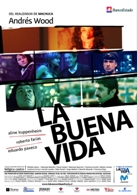Blog del Instituto Cervantes de Dublín
Torre Martello
La biblioteca propone / The library suggests

Este mes te ofrecemos dentro de la actividad cultural la tercera edición del ciclo dedicado al cine de Chile que en esta ocasión tiene como tema central el cine y la literatura. De esta manera en la biblioteca dedicamos el tema del mes a la cinematografía de Chile.
Centrándonos en su producción más reciente se habla del nuevo cine chileno como aquel que comenzó en la década de los 60 y se extiende hasta la actualidad. Recibe influencias principalmente de la cultura nacional de la década de los 60, la nueva canción chilena y producciones de otras latitudes, como el Cinema Novo brasileño.
Este movimiento de cineastas chilenos más próximos a la izquierda hay que entenderlo como influencia directa de la realidad social y política del continente americano. La fecha simbólica de su inicio es la primera edición del Festival de Cine de Viña del Mar en 1967 donde se sentaron principios como el de desarrollar una cultura nacional y abordar los diversos conflictos sociales.
La dictadura surgida a partir del golpe de estado de 1973 supuso el exilio masivo de sus cineastas que desde el exilio denunciaron la represión del régimen militar con un tono de nostalgia por la revolución truncada. Cineastas destacados son Miguel Littin, Patricio Guzmán o Raúl Ruiz.
En los últimos años el cine chileno ha vivido un fuerte auge. En el pasado Festival de Cine de Berlín la película Gloriaobtuvo una excelente acogida y su protagonista (Paulina García) obtuvo el galardón a la mejor actriz del certamen. En enero de este año la película Noprotagonizada por Gael García Bernal obtuvo la primera nominación de Chile al Óscar a la mejor película de habla no inglesa. Estos éxitos se deben en gran parte a un sólido programa de políticas públicas que han apoyado la consolidación de una industria de pequeñas dimensiones que se ha profesionalizado gracias a recursos provistos desde el Estado, primero, con la creación del Fondo Audiovisual en 2004, y a partir del 2010, con nuevos instrumentos para la internacionalización del sector audiovisual.
This month we offer you the 3rd Chilean Cinema Season as part of our cultural program. The main theme is the connection between cinema and literature. Therefore the cinema from Chile is our topic of the month in April.
The called New Chilean Cinema is its most recent production. It started in the sixties and it is still present. It was influenced by the national culture of the sixties, the new Chilean song and productions from other latitudes as the Cinema Novo from Brazil.
The majority of Chilean filmmakers were left-wing supporters and they were hugely influenced by the social and political reality of America at that time. In 1967 the first edition of the Cinema Festival of Viña del Mar set the principles: to develop a national culture and approach different social issues.
After the coup d’état in 1973, the new dictatorship meant the massive exile of the filmmakers who from the distance condemned the repression of the military regime with a nostalgic tone for the interrupted revolution. Some remarkable directors are Miguel Littin, Patricio Guzmán or Raúl Ruiz.
In the last few years Chilean cinema is reaching a height. In the last Berlin International Film Festival the film Gloria received praised from the critics and its star (Paulina García) received the Best Actress Award. In January 2013 the film No starring Gael García Bernal got the first nomination of Chile to the Oscar for Best Foreign Film.
This success is partly the consequence of a solid programme of public policies that have supported the consolidation of an industry of small size that is getting a professional character thanks to the resources provided by the Government. The Audiovisual Fund was created in 2004 and in 2010 new instruments for the internationalization of the sector has been promoted.
Entradas relacionadas
Etiquetas
Biblioteca Dámaso Alonso Biblioteca Instituto Cervantes Chile Chilean cinema Cine chileno La biblioteca sugiere Latin American Cinema Spanish Library in Dublin The library suggests



